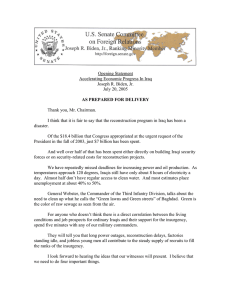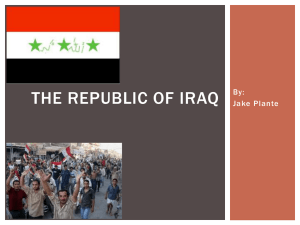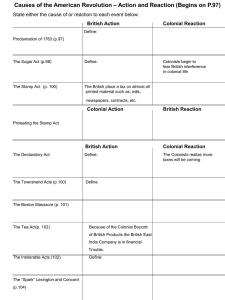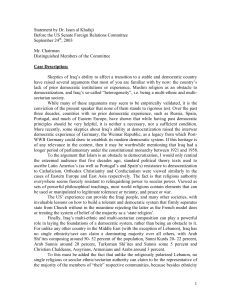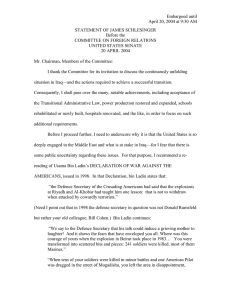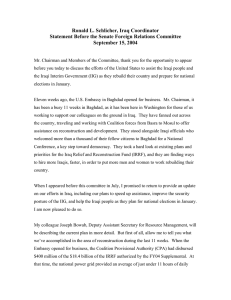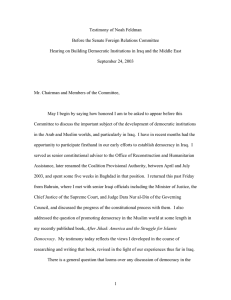Senate Foreign Relations Committee Chairman Richard Lugar Opening Statement for Hearing on
advertisement
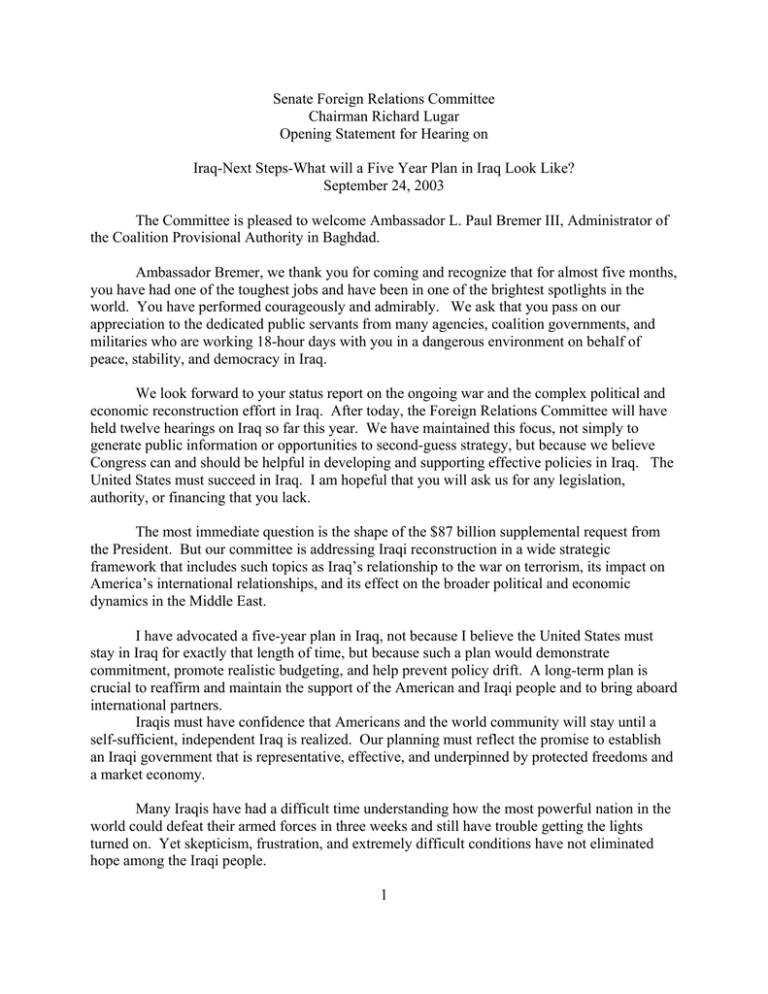
Senate Foreign Relations Committee Chairman Richard Lugar Opening Statement for Hearing on Iraq-Next Steps-What will a Five Year Plan in Iraq Look Like? September 24, 2003 The Committee is pleased to welcome Ambassador L. Paul Bremer III, Administrator of the Coalition Provisional Authority in Baghdad. Ambassador Bremer, we thank you for coming and recognize that for almost five months, you have had one of the toughest jobs and have been in one of the brightest spotlights in the world. You have performed courageously and admirably. We ask that you pass on our appreciation to the dedicated public servants from many agencies, coalition governments, and militaries who are working 18-hour days with you in a dangerous environment on behalf of peace, stability, and democracy in Iraq. We look forward to your status report on the ongoing war and the complex political and economic reconstruction effort in Iraq. After today, the Foreign Relations Committee will have held twelve hearings on Iraq so far this year. We have maintained this focus, not simply to generate public information or opportunities to second-guess strategy, but because we believe Congress can and should be helpful in developing and supporting effective policies in Iraq. The United States must succeed in Iraq. I am hopeful that you will ask us for any legislation, authority, or financing that you lack. The most immediate question is the shape of the $87 billion supplemental request from the President. But our committee is addressing Iraqi reconstruction in a wide strategic framework that includes such topics as Iraq’s relationship to the war on terrorism, its impact on America’s international relationships, and its effect on the broader political and economic dynamics in the Middle East. I have advocated a five-year plan in Iraq, not because I believe the United States must stay in Iraq for exactly that length of time, but because such a plan would demonstrate commitment, promote realistic budgeting, and help prevent policy drift. A long-term plan is crucial to reaffirm and maintain the support of the American and Iraqi people and to bring aboard international partners. Iraqis must have confidence that Americans and the world community will stay until a self-sufficient, independent Iraq is realized. Our planning must reflect the promise to establish an Iraqi government that is representative, effective, and underpinned by protected freedoms and a market economy. Many Iraqis have had a difficult time understanding how the most powerful nation in the world could defeat their armed forces in three weeks and still have trouble getting the lights turned on. Yet skepticism, frustration, and extremely difficult conditions have not eliminated hope among the Iraqi people. 1 A recent poll, conducted by Zogby International working with the American Enterprise Institute, found that 70 percent of Iraqis feel that their country will be better off five years down the road, and 71 percent believe that they personally will be better off in five years. Iraqis, by a three-to-one margin, responded that politics, not economics, will be the harder part of the reconstruction. Asked to choose which government they saw as the best model for Iraq from among Syria, Iran, Egypt, Saudi Arabia or the United States, 37 percent picked the United States. Only 33 percent said they preferred an Islamic government. Two-thirds said that U.S. troops should remain in Iraq for at least another year. Statistics can be misleading, but as a scientific survey, these responses are encouraging. I am hopeful that you can shed light on other positive developments of which the American people are not aware, while keeping in mind that they worry about the extreme dangers that persist and, in some cases, seem to be increasing even as the summer heat dissipates. To set the stage for our inquiries today, I would offer the following set of questions: 1) What would the five-year plan for Iraq look like and how much would it cost? How long will the $87 billion from the Supplemental last? How long will the $21 billion targeted for reconstruction last? Will this U.S. commitment help generate international contributions at the donor conference in October? How does oil revenue fit into projections of reconstruction financing? 2) Do you have the right people in place in Iraq? Are there enough Arab linguists, international economists, public diplomacy experts, development analysts, and technical experts? What skills do our personnel lack? Can expanded international involvement improve our capabilities? 3) You have been tremendously upbeat regarding prospects for success in Iraq. Although much progress has been made, what worries you about your plans? What needs to be fixed within the Coalition Provisional Authority? 4) Much has been made about transferring authority to the Iraqis quickly. You envision turning power over to Iraqi leadership in stages, as institutions become capable of taking on responsibilities. How do you plan to integrate Iraqi government institutions into the Coalition’s effort? Are there any areas or ministries where the transfer process will soon occur? 5) Finally, as we look to our foreign policy equities, calling on your experience in diplomacy and terrorism, where does Iraq now fit in the Global War on Terrorism? Are Middle East neighbors of Iraq providing sufficient cooperation? Again, Ambassador Bremer, we thank you for joining us today, and we look forward to your testimony and our continuing dialog on these issues. ### 2
